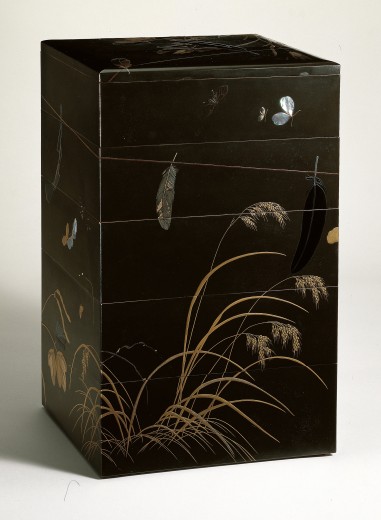 Print Page
Print Page
 Print Page
Print Page
Location: Japan
Materials: hiramaki-e, takamaki-e, kirikane, harigaki, ishime, kakiwari, keuchi, kuromaki-e, ivory, gold, silver, seed pearls
Dimensions: 39.6 x 22.8 x 24.4 cm
Accession Number: GL 9
Other Notes:
A five-tiered jubako with two lids, decorated with harvest motifs: susuki, millet, rice, oats, barley, and adzuki plants with long pods of beans. Thin bamboo canes support a loose string hung with naruko (bird-scarers), while a tauter line is adorned with bird feathers and gohei (paper offerings to the gods). Tiny butterflies hover overhead. The spare lid decorated with susuki and another bird-scarer. These designs executed in gold, silver, and black hiramakie and takamakie, with details in shell, kirikane, ivory, gold, and silver, seed pearls, harigaki, ishime, kakiwari, keuchi, and kuromakie, on a seidonuri ground. The interiors of nahiji on a black ground.
Goke (Bakumatsu kaikaki no shikko kaiga, Nos. 7-13) reproduces four more jubako by Shibata Zeshin and lists documentary evidence, based on the catalogues of exhibitions held in 1889 and 1940, for the existence of a further fifteen. This one, not reproduced by Goke, is almost certainly the second in his list, described as a ‘five-tiered box with a substitute lid and makie design of the five cereals’. The present jubako is another of the major works of Zeshin owned by the Yoshiie family (see GL 1), a provenance based on a paper label on the outer box indicating that this was number 236 in their inventory.
The storage-box is inscribed Seidonuri kakubutsu cho makie godanju [five-tiered box with cereals and butterflies in makie on a seidonuri ground] and Senko Shibata Zeshin saku otoko Umezawa Ryushin kan [Made by my late father Shibata Zeshin; certified by his son Umezawa Ryushin], with a seal Ryushin.
Bibliography:
O. Impey, M. Fairley, J. Earle (eds.), Meiji No Takara: Treasures Of Imperial Japan: Lacquer Vol II, London 1995, cat. 197.
J. Earle (ed.), Meiji No Takara: Treasures Of Imperial Japan: Masterpieces by Shibata Zeshin, London 1996, cat. 23.
